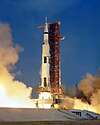Saturn INT-21
This article needs additional citations for verification. (October 2008) |
 The Saturn INT-21 would have been similar to the Saturn V which launched the Skylab space station, on May 14, 1973 | |
| Function | Launch vehicle |
|---|---|
| Manufacturer |
|
| Country of origin | United States |
| Size | |
| Height | 98.5 m (323 ft) (without payload) |
| Diameter | 10.06 m (33.0 ft) |
| Mass | 2,916,080 kg (6,428,860 lb) |
| Stages | 2 |
| Capacity | |
| Payload to LEO | |
| Mass | 115,900 kg (255,500 lb) |
| Launch history | |
| Status | Study |
| Launch sites | LC-39A, Kennedy Space Center |
| Total launches | 0 |
| First stage - S-IC | |
| Engines | 5 Rocketdyne F-1 |
| Thrust | 34.02 MN (7,650,000 lbf) |
| Burn time | 150 seconds |
| Propellant | RP-1 / LOX |
| Second stage S-II | |
| Engines | 5 Rocketdyne J-2 |
| Thrust | 5 MN (1,100,000 lbf) |
| Burn time | 360 seconds |
| Propellant | LH2 / LOX |
The Saturn INT-21 was a study for an American orbital launch vehicle of the 1970s.[1] It was derived from the Saturn V rocket used for the Apollo program, using its first and second stages and capable of placing 115,900 kg (255,500 lb) to LEO, but lacking the third stage.[2] The guidance unit would be moved from the top of the third stage to the top of the second stage. The INT-21 was never flown.
A related variant was launched once, from the Kennedy Space Center, Florida carrying the Skylab space station into orbit, at 17:30 UTC, on May 14, 1973.[3][4][5] As Skylab was built from an S-IVB stage, there was no need to move the guidance unit. This version was intended to be used for other flights in the Apollo Applications Program, and would have also been used to launch other American space stations,[5] including Skylab B.
See also
[edit]- Comparison of orbital launch systems
- Apollo program
- Saturn I
- Saturn IB
- Saturn V
- Skylab
- Apollo Applications Program
- S-IC
- S-II
- Saturn I SA-1
References
[edit]- ^ Johnson, Kurt P.; Holl, Richard J. (June 1970). "Nuclear Shuttle for Interorbital and Transplanetary Applications". Journal of Spacecraft and Rockets. 8 (6): 600–606. Bibcode:1971JSpRo...8..600J. doi:10.2514/3.59699. ISSN 0022-4650.
- ^ Wade, Mark (2019). "Saturn INT-21". Encyclopedia Astronautica. Retrieved January 18, 2024.
- ^ Young, Anthony (February 19, 2019). The Saturn V F-1 Engine: Powering Apollo into History. Springer. p. 245. ISBN 978-0-387-09630-8.
- ^ Rumerman, Judy (August 27, 2009). "Spaceflight :Skylab". Centennial of Flight Commission. Archived from the original on August 27, 2009. Retrieved January 18, 2024.
- ^ a b Space station MSFC-DPD-235/DR no. CM-02 specification, space station project (modular) (Technical report). McDonnell Douglas & NASA. December 10, 1971. 19720008134. Archived from the original on April 9, 2024 – via NASA Technical Reports Server.

